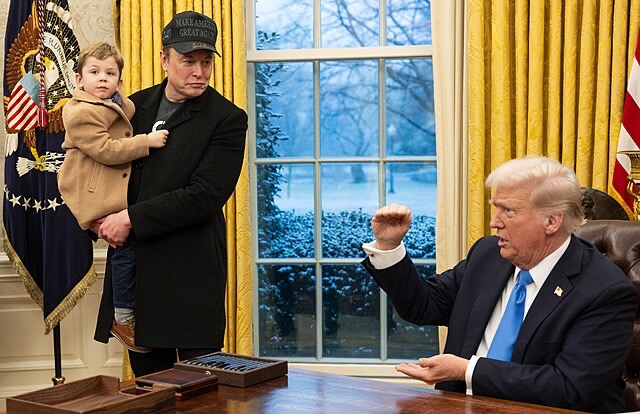Elon Musk, the tech titan known for steering rockets into orbit and cars into the future, just dropped one of the biggest political bombshells of the year—he’s stepping down from his role at the Department of Government Efficiency (DOGE). And not just stepping down quietly—this move comes amid whispers that President Trump, the very man who appointed him, had growing doubts about Musk’s direction. What seemed like a wild but potentially genius pairing between Washington and Silicon Valley has now ended in a dramatic, headline-dominating split.
But why did this happen? Why now? And what does it mean for the department that was supposed to revolutionize the federal government? This isn’t just about Musk or Trump—it’s about the heart of how America manages its money and the growing tug-of-war over what government should look like in the 21st century.
What is DOGE?
The Origin of DOGE
DOGE—or the Department of Government Efficiency—sounds like something from a dystopian political satire, but it’s very real. Conceived by the Trump administration in 2024, DOGE was supposed to be the answer to what conservatives have long decried: a bloated, inefficient federal government drowning in red tape and wasteful spending. And who better to fix that, Trump argued, than Elon Musk?
DOGE’s mission was simple in theory but brutal in execution: slash spending, eliminate waste, and bring business-style efficiency to the halls of government. It was a bold, radical idea—one that needed someone equally bold and radical to run it.
DOGE’s Mission and Role in Government
The plan was audacious. DOGE aimed to cut up to $2 trillion in federal expenditures over a decade. That meant everything from consolidating agencies to outright eliminating what Musk reportedly called “zombie departments”—offices that existed more out of inertia than necessity.
Unlike most government departments that slowly develop over years, DOGE was rolled out fast. It had sweeping authority to audit federal programs, recommend closures, and redirect funds. Critics immediately sounded alarms. Supporters hailed it as a long-overdue disruption.
But with that disruption came conflict. Federal workers feared layoffs. Politicians feared blowback. And it all began to wear thin—especially as Musk’s methods grew more aggressive and less politically palatable.
Elon Musk’s Appointment to DOGE
Why Trump Chose Elon Musk
Let’s be real—Elon Musk was an odd but headline-grabbing choice. He wasn’t a policy wonk. He wasn’t even a political insider. But that was the point.
Trump saw in Musk a kindred spirit: an anti-establishment disruptor who thrived on chaos, challenged norms, and loved attention. Musk’s record with Tesla, SpaceX, and Neuralink made him appear capable of imagining and executing big, bold ideas—just the kind of energy DOGE needed to bulldoze bureaucratic inertia.
Musk’s fanbase didn’t hurt either. Millions of Americans, especially younger conservatives and libertarians, viewed him as a visionary. Appointing him to DOGE gave the department instant credibility among those who might otherwise distrust any new federal agency.
Musk’s Leadership Style and Impact
Once in, Musk wasted no time. He brought in tech-style management techniques: flat hierarchies, rapid audits, aggressive timelines. Departments were told to justify their budgets or face the axe. Redundant programs were cut within months. He even installed an internal Slack system with meme-based morale boosters—though that didn’t go over so well with career bureaucrats.
But his style was polarizing. What some praised as needed urgency, others slammed as reckless and autocratic. Federal employee unions filed lawsuits. Internal morale tanked. Entire departments protested. Still, Musk pressed on, convinced that the only way to fix the system was to break it first.
The Fallout: Elon Musk Steps Down
The Shocking Announcement
The announcement came like a lightning bolt. Musk, who just months ago was touting DOGE’s progress on X (formerly Twitter), declared he would be stepping down in May 2025. The internet exploded. Was he forced out? Did he quit? Or did the growing backlash finally get to him?
Officially, Musk cited “strategic divergence” and a desire to refocus on his core companies. But sources close to the situation suggest that behind the scenes, the situation was far messier. DOGE had become a political albatross, and the Musk-Trump alliance was showing cracks.
Trump’s Reaction and Private Doubts
Publicly, Trump kept it vague. In a press conference, he remarked, “I think it will end,” when asked about DOGE’s future—hardly a ringing endorsement. Reports suggest that Trump’s inner circle had become wary of Musk’s increasingly controversial actions, from calling for NGO arrests to pouring millions into state-level races.
Privately, Trump’s doubts about DOGE’s direction had grown louder. What started as a PR win was fast becoming a liability. And with an election looming, Trump didn’t want a rogue agency dragging down his approval.
Controversies That Shaped the End
DOGE’s Unpopularity Among Constituents
What really tipped the scales? The voters. Despite initial enthusiasm, many of Trump’s working-class supporters were hit hard by DOGE’s cuts. Federal programs they relied on were downsized or shuttered. Job losses mounted. Suddenly, the man who promised to fight for them was backing an agency that was slashing their safety nets.
Unions and Democratic leaders pounced. Protests swelled. Lawsuits flew. Even some conservative lawmakers began to distance themselves from DOGE. The tide had turned.
Legal Challenges and Political Pressure
From day one, DOGE faced legal scrutiny. Critics argued that its sweeping powers violated constitutional boundaries. When federal judges started issuing injunctions, the writing was on the wall. DOGE was now mired in legal battles, unable to move fast or far.
The political heat got intense. Congressional hearings were threatened. Media exposés mounted. The narrative was spiraling out of control.



